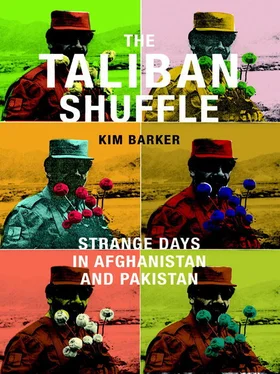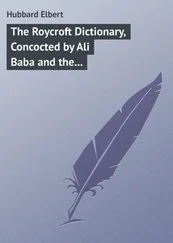“Bag of dirt,” Crowley said.
“You locked and loaded?”
“No.”
That was our usual exchange, even though soldiers were always supposed to have a round in the chamber, ready to fire. We climbed back into our Humvees and bumped down the ruts that passed for roads at a whopping ten miles an hour, the fastest we could go, making our sad, slow escape into the beige sameness of Paktika. We soon set off on a foot patrol near a mud-walled compound. The soldiers from the Afghan National Army (ANA) went first, in a move to respect the local culture and show that Afghans were taking charge of security. A kid ran inside the compound. Other children started crying.
“I don’t want to talk to you,” said a boy, crying inside the doorway.
A neighbor, a man, walked over.
“The men aren’t here. They went to town.”
A little girl started crying. “I’m scared,” she said.
For a hearts-and-minds mission, even one designed to embolden local leaders, this one was starting to fall apart. The Americans decided to fall back.
“Why did you guys come here?” the neighbor asked.
“We’re leaving,” the translator said. “I don’t know.”
Then he turned to me. “It’s so difficult. The people don’t want to talk. They are scared. They say, ‘We are gonna go to jail.’”
I knew this from Afghans—they feared that once the American soldiers showed up at a compound, someone would be carted away and locked up for no reason. This rumor had spread after raids had led to detentions in other villages. In this mostly illiterate country where the rural areas had little in the way of media, news still spread largely through rumor, through word of mouth. Many Afghans had also used the Americans to carry out their own personal vendettas, dropping a dime on some rival who had nothing to do with the Taliban, Al-Qaeda, or any of the other insurgent groups who didn’t want foreign troops in Afghanistan.
We left. Almost immediately, the Humvee in front of us broke down. It had been in the shop for a broken fuel pump twice that week. Now it was dead again, choked with the dust that coated everything, somehow working its way beneath fingernails, into the corners of mouths, behind ears, without even trying. We tied up the Humvee to tow it. The soldiers swore. Everything here took forever. Everything moved at the pace of a Humvee towed by red tape over a moonscape. It was one step forward, four steps back. Thus impaired, lugging more than five tons of dead weight, we rolled on to the next village, finding a hostile man working near a ditch.
“Who is your president?” asked a sergeant major, testing the man’s knowledge.
“Karzai,” replied the hostile man, who had muddy feet. He paused. “Why are you here?”
“Ensuring safety and security to the Afghan people,” the sergeant major said. He nodded. “The ANA is here today.”
Muddy Feet looked at the sergeant major as if he were impaired. Of course he knew who was president. Of course he knew the ANA was there. He was not stupid. He was not blind. And this conversation was not off to a good start.
“We agree President Karzai is our president,” Muddy Feet said, somewhat carefully. “We appreciate our ANA soldiers. You’re looking for caches? You’re going to search for weapons? You should get permission from our government.”
Muddy Feet had just tripped a magic switch. He mentioned “caches,” as in “caches of weapons.”
The sergeant major looked at the translator. “Why did he bring up caches, when we didn’t even talk about it?”
The translator shrugged.
“I think you’re going to check in our houses,” Muddy Feet said, correctly reading the situation. He shook his head. “That’s wrong.”
A boy in a Scooby-Doo T-shirt walked up and stared at me. The sergeant major and Muddy Feet stared at each other.
“I’m not afraid of you,” Muddy Feet said.
“He’s hiding something,” the sergeant major said to the translator.
An elder walked up. How did I know? He had a turban and a beard, and all the Afghans parted for him deferentially. The sergeant major turned to the man in charge.
“I’ve got one question for you,” the sergeant major said. “One of your village members brought up the word ‘cache.’ Do you know anything about a cache?”
“I don’t know,” the elder said. “I came here fifteen days ago from Karachi.”
“Oh, Pakistan!” the sergeant major said, as if that made everything clear. “So you can tell me about the Taliban or Al-Qaeda coming across the border.”
The elder stared at him. This was awkward. The Afghan soldiers were sent to search Muddy Feet’s compound. They did, finding nothing.
“Tea?” the elder asked.
“Sure,” a staff sergeant answered before the sergeant major could say anything. “I’m here to socialize. Whatever he wants.” He took off his helmet.
“Take care of your helmet,” Muddy Feet said. “Someone might steal it.”
We all walked inside a nearby compound, into a sitting room near the front. Mop-haired girls with kohl-lined eyes and bright orange and green dresses poked their heads around a corner to giggle and stare. We dropped onto cushions in a room. All the Americans took off their helmets and body armor and rested them and their weapons against the wall.
“Whenever you want to come here, you can come here,” the elder told them.
A boy poured the sweet milky tea from a thermos and quickly handed us each a cup.
“Some questions,” the staff sergeant started. “Do you know about any jingle-truck robberies?”
The elder thought, looked at the ceiling. “Whoever did it, they’re not Afghans. They might be from another country.”
“What about an IED?”
“I don’t know, I was not here,” the elder said.
“If you have any problems in the village, come to the base,” the staff sergeant told the Afghans. They nodded. Sure they would.
Mission accomplished, we stood, and after lacing up our boots at the door, walked out.
“Let’s go sing ‘Kumbaya,’” the staff sergeant said, before heading back to the base. I was pretty sure he was joking.
Everywhere we went, we heard the same story. No jingle trucks. No IEDs. No one named Wali.
The roads were so bad that convoys could barely go anywhere. It raised an obvious question—three and a half years after the fall of the Taliban, out near a small U.S. military base in a onetime Taliban haven near the border with Pakistan, little had been improved, like roads and power. The soldiers seemed to be marking time, handing out candy and meeting with elders who just talked about how much they needed. The soldiers were forced to double as aid workers, and aid was noticeably absent. Still, I was told it was better than before—these were the first U.S. soldiers many villagers had seen in two years. Just outside the base, a new cobblestone road named “The Road of the Future” was being built. At about a mile and a half long and with a U.S. price tag of $200,000, it would be the province’s first cobblestone road—slight progress, and an indication of how much effort and money was needed for the smallest of improvements in Afghanistan.
The photographer and I spent most of our time sitting inside the forward operating base, called a “FOB,” like the other fobbits, the nickname for people who spent all their time inside the wire. I watched all of Band of Brothers . I worked out in the gym. I drank a lot of water and went to bed early every night. I actively avoided calling or e-mailing Chris, falling back on the excuse that I was at war, after all. Being here was like being at the Afghan version of a spa, with no liquor, plenty of sleep, little stress, and little Internet access. I didn’t have to worry about the daily news. I didn’t have to worry about anything.
Читать дальше











